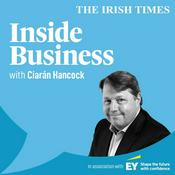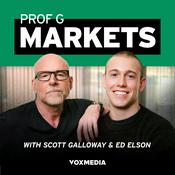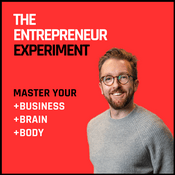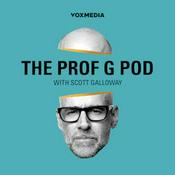108 episodes
- Jaime Hunt welcomes Adam Stoltz, Director of Enrollment Marketing at the University of Idaho, for a candid conversation on one of higher ed’s toughest challenges: marketing academic programs in a decentralized, siloed environment. From tackling the “order taker” mentality to building partnerships between colleges, admissions, and marketing teams, Adam shares how he’s helped bridge institutional gaps to drive strategic enrollment growth. If you’ve ever felt stuck translating institutional priorities into student-centric campaigns, this episode is packed with the real talk and actionable strategies you need.
Guest Name: Adam Stolz, Director of Enrollment Marketing, University of Idaho
Guest Social: https://www.linkedin.com/in/adamstoltz/
Guest Bio: With over two decades of experience in higher education marketing and enrollment management, Adam Stolz holds an Ed.D. in higher education administration from Saint Louis University, a bachelor's degree in arts management with a minor in computer science, and a master's degree in organizational leadership and management. His career includes progressive leadership roles across diverse university settings—private, public, land-grant, flagship, and the largest state system in the country. He has received multiple marketing awards for his work, with expertise in CRM strategy, and he also serves as a higher education consultant. Currently, he is the Director of Enrollment Marketing at the University of Idaho, where he is part of the university’s marketing team, reporting to the Chief Marketing Officer, and embedded with the Vice Provost for Strategic Enrollment Management.
- - - -
Connect With Our Host:
Jaime Hunt
https://www.linkedin.com/in/jaimehunt/
https://twitter.com/JaimeHuntIMC
About The Enrollify Podcast Network:
Confessions of a Higher Ed CMO is a part of the Enrollify Podcast Network. If you like this podcast, chances are you’ll like other Enrollify shows too!
Enrollify is made possible by Element451 — The AI Workforce Platform for Higher Ed. Learn more at element451.com.
Hosted by Simplecast, an AdsWizz company. See pcm.adswizz.com for information about our collection and use of personal data for advertising. Ep. 95: Culture as a Competitive Edge: The Case for Soft Skills in Higher Ed Marketing
07/1/2026 | 44 mins.Jaime Hunt sits down with Kelly Hiller, Chief Marketing Officer at Purdue University, to explore a revolutionary idea: integrating soft skills into performance management. Hiller shares how Purdue's Brand Studio is not only delivering exceptional marketing but also cultivating a high-performing, emotionally intelligent team culture. This episode is a must-listen for higher ed marketers looking to future-proof their teams and foster stronger leadership pipelines.
Guest Name: Kelly Hiller, Chief Marketing Officer, Purdue University
Guest Social: www.linkedin.com/in/kelly-hiller
Guest Bio: Kelly Hiller serves as the Chief Marketing Officer at Purdue University, where she has the honor of leading a dynamic team of professionals dedicated to elevating the Purdue brand. As an in-house agency, Purdue Brand Studio crafts compelling content that not only drives demand but also promotes and protects Purdue. Kelly has been working at Purdue since January 2005, when she joined the university’s marketing department as communications coordinator. In 2008 she transitioned to the Purdue Alumni Association, where she managed the communications team and oversaw production of Purdue Alumnus magazine. These roles laid the foundation for her later accomplishments, including leading the Giant Leaps Campaign during Purdue's 150th anniversary, which launched at Homecoming 2018 and concluded at Homecoming 2019. This experience remains a career highlight for her. Known for her ability to remain strong yet flexible amid the winds of chaotic change, she finds daily inspiration in the words "Nevertheless She Persisted," which she had tattooed on her wrist as a reminder to take a deep breath and focus on finding solutions in tough situations. Passionate about small-town revitalization, Kelly serves on the school board in her hometown of Attica, Indiana. As a proud mom of four, Kelly's dedication extends to her family. She enjoys spending quality time with her loved ones and supporting various community events. Kelly values the close-knit, supportive atmosphere within her team, where egos are checked at the door and successes are shared. For Kelly, leading at Purdue is not just a job but a family endeavor, where hard work is balanced with fun and care for one another.
- - - -
Connect With Our Host:
Jaime Hunt
https://www.linkedin.com/in/jaimehunt/
https://twitter.com/JaimeHuntIMC
About The Enrollify Podcast Network:
Confessions of a Higher Ed CMO is a part of the Enrollify Podcast Network. If you like this podcast, chances are you’ll like other Enrollify shows too!
Enrollify is made possible by Element451 — The AI Workforce Platform for Higher Ed. Learn more at element451.com.
Hosted by Simplecast, an AdsWizz company. See pcm.adswizz.com for information about our collection and use of personal data for advertising.- In this episode of Confessions of a Higher Ed CMO, host Jaime Hunt sits down with Jen Brock, Vice President for Marketing and Communications at Mount Holyoke College. Together, they explore the evolving role of marketing leaders in higher ed during politically charged times, what it means to be radically mission-driven, and how inclusive, gender-diverse institutions like Mount Holyoke navigate a fraught national landscape. Brock shares candid insights on balancing bold storytelling with institutional responsibility—and why staying true to your values is non-negotiable in today’s higher ed climate.
Guest Name: Jen Brock, Vice President for Marketing and Communications, Mount Holyoke College
Guest Social: https://www.linkedin.com/in/jenbrock/
Guest Bio: Jen Brock is Vice President for Marketing and Communications at Mount Holyoke College, a trailblazing institution that champions gender diversity and women’s leadership. She has dedicated her career to advancing mission-driven institutions through inclusive, strategic storytelling, holding communications leadership roles in higher education and K-12 schools (public and private). Deeply committed to equity and education, Jen frequently presents about her family’s experience in the Japanese American incarceration camps of WWII.
- - - -
Connect With Our Host:
Jaime Hunt
https://www.linkedin.com/in/jaimehunt/
https://twitter.com/JaimeHuntIMC
About The Enrollify Podcast Network:
Confessions of a Higher Ed CMO is a part of the Enrollify Podcast Network. If you like this podcast, chances are you’ll like other Enrollify shows too!
Enrollify is made possible by Element451 — The AI Workforce Platform for Higher Ed. Learn more at element451.com.
Hosted by Simplecast, an AdsWizz company. See pcm.adswizz.com for information about our collection and use of personal data for advertising. - Jaime Hunt sits down with Meaghan Milliorn, Senior Director of Web Strategy and Operations at the University of Arkansas at Little Rock, to unpack the web redesign process that earned national recognition. From overhauling outdated pages to building authentic buy-in through internal communications, Meaghan shares how a multi-year strategy helped UA Little Rock redefine its web presence—without losing the campus community along the way. If you're staring down the barrel of a major website overhaul, this episode is a must-listen.
Guest Name: Meaghan Milliorn, Senior Director of Web Strategy at the University of Arkansas at Little Rock
Guest Social: https://www.linkedin.com/in/meaghan-milliorn-fikes/
Guest Bio: Meaghan Milliorn has worked at the University of Arkansas at Little Rock for 16 years and serves as the Senior Director of Web Strategy and Operations. She and her team are responsible for overseeing the university website, its strategic focus, and ensuring it meets the needs of future and current students. In 2025, she led the successful launch of the redesigned university website. She earned her degree in mass communication from UA Little Rock and is actively involved with Digital Collegium and its annual conference.
- - - -
Connect With Our Host:
Jaime Hunt
https://www.linkedin.com/in/jaimehunt/
https://twitter.com/JaimeHuntIMC
About The Enrollify Podcast Network:
Confessions of a Higher Ed CMO is a part of the Enrollify Podcast Network. If you like this podcast, chances are you’ll like other Enrollify shows too!
Enrollify is made possible by Element451 — The AI Workforce Platform for Higher Ed. Learn more at element451.com.
Hosted by Simplecast, an AdsWizz company. See pcm.adswizz.com for information about our collection and use of personal data for advertising. - Jaime Hunt sits down with Tamalyn Powell, SVP of Higher Education at BVK, to discuss the groundbreaking national campaign Proud Sponsor of America at Its Best. Designed to reshape public perception around the value of higher education, this initiative tackles rising skepticism head-on. Through data-driven messaging and a non-partisan approach, this campaign offers marketing leaders a powerful tool to advocate for higher ed’s relevance and societal impact. If you’re wondering how to counter declining trust in higher ed and drive collective impact, this episode is a must-listen.
Guest Name: Tam Powell, Senior Vice President, BVK
Guest Social: https://www.linkedin.com/in/tamalyn-powell-850a323/
Guest Bio: Tam focuses her efforts on how she and the higher education team can help clients break through the clutter. Tam is an expert in brand positioning and is responsible for all aspects of marketing, communications, planning and strategy on behalf of BVK’s broad portfolio of higher education clients across the country. As BVK’s higher education brand champion, her latest endeavor - in partnership with BVK’s non-profit sister agency Serve Marketing - is producing and launching a national campaign highlight the impact of higher education in the United States to combat the negative narrative around the value of college.
- - - -
Connect With Our Host:
Jaime Hunt
https://www.linkedin.com/in/jaimehunt/
https://twitter.com/JaimeHuntIMC
About The Enrollify Podcast Network:
Confessions of a Higher Ed CMO is a part of the Enrollify Podcast Network. If you like this podcast, chances are you’ll like other Enrollify shows too!
Enrollify is made possible by Element451 — The AI Workforce Platform for Higher Ed. Learn more at element451.com.
Hosted by Simplecast, an AdsWizz company. See pcm.adswizz.com for information about our collection and use of personal data for advertising.
More Business podcasts
Trending Business podcasts
About Confessions of a Higher Ed CMO — with Jaime Hunt
Confessions of a Higher Ed CMO is like a conference in a podcast, offering a blend of professional wisdom, innovative ideas, and personal anecdotes. Whether you're a higher ed marketer, a faculty member curious about the behind-the-scenes of university branding, or just someone with an interest in the intersection of education and marketing, the podcast is your gateway to the lesser-known narratives of higher education.
In each episode, host Jaime Hunt engages in candid and insightful conversations with leading minds in the field, exploring not just the nuts and bolts of marketing, but also the diverse and often unexpected challenges and stories that define higher education marketing.
Our guests, a mix of seasoned CMOs, innovative thinkers, and key influencers in the higher ed sector, don't just share their professional triumphs; they open up about their personal journeys and share their candid insights.. The podcast goes beyond the conventional, bringing to light the real stories behind campus campaigns, the evolving nature of student engagement, and the creative challenges in this unique field.
With a host renowned for establishing a warm and engaging rapport, each episode feels less like an interview and more like a conversation between old friends. The discussions are not only thoughtful and informative but sprinkled with moments of humor and fun, capturing the essence of what it's like to navigate the complex world of higher education marketing. Confessions of a Higher Ed CMO is hosted by Jaime Hunt and is a proud member of the Enrollify Podcast Network.
Podcast websiteListen to Confessions of a Higher Ed CMO — with Jaime Hunt, Inside Business with Ciaran Hancock and many other podcasts from around the world with the radio.net app

Get the free radio.net app
- Stations and podcasts to bookmark
- Stream via Wi-Fi or Bluetooth
- Supports Carplay & Android Auto
- Many other app features
Get the free radio.net app
- Stations and podcasts to bookmark
- Stream via Wi-Fi or Bluetooth
- Supports Carplay & Android Auto
- Many other app features


Confessions of a Higher Ed CMO — with Jaime Hunt
Scan code,
download the app,
start listening.
download the app,
start listening.






































